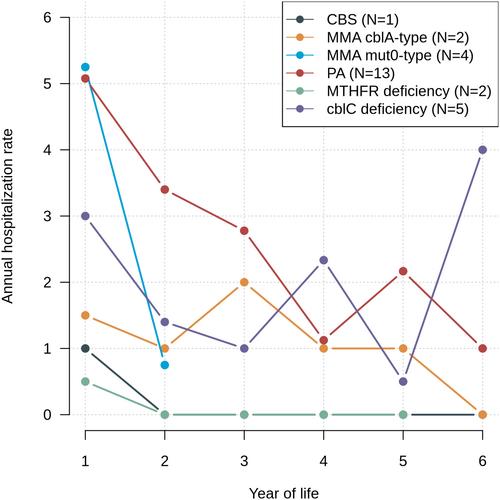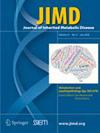Outcomes after newborn screening for propionic and methylmalonic acidemia and homocystinurias
Abstract
The current German newborn screening (NBS) panel includes 13 inherited metabolic diseases (IMDs). In addition, a NBS pilot study in Southwest Germany identifies individuals with propionic acidemia (PA), methylmalonic acidemia (MMA), combined and isolated remethylation disorders (e.g., cobalamin [cbl] C and methylenetetrahydrofolate reductase [MTHFR] deficiency), cystathionine β-synthase (CBS) deficiency, and neonatal cbl deficiency through one multiple-tier algorithm. The long-term health benefits of screened individuals are evaluated in a multicenter observational study. Twenty seven screened individuals with IMDs (PA [N = 13], MMA [N = 6], cblC deficiency [N = 5], MTHFR deficiency [N = 2] and CBS deficiency [N = 1]), and 42 with neonatal cbl deficiency were followed for a median of 3.6 years. Seventeen screened IMD patients (63%) experienced at least one metabolic decompensation, 14 of them neonatally and six even before the NBS report (PA, cbl-nonresponsive MMA). Three PA patients died despite NBS and immediate treatment. Fifteen individuals (79%) with PA or MMA and all with cblC deficiency developed permanent, mostly neurological symptoms, while individuals with MTHFR, CBS, and neonatal cbl deficiency had a favorable clinical outcome. Utilizing a combined multiple-tier algorithm, we demonstrate that NBS and specialized metabolic care result in substantial benefits for individuals with MTHFR deficiency, CBS deficiency, neonatal cbl deficiency, and to some extent, cbl-responsive MMA and cblC deficiency. However, its advantage is less evident for individuals with PA and cbl-nonresponsive MMA.
Synopsis
Early detection through newborn screening and subsequent specialized metabolic care improve clinical outcomes and survival in individuals with MTHFR deficiency and cystathionine-β-synthase deficiency, and to some extent in cobalamin-responsive methylmalonic acidemia (MMA) and cblC deficiency while the benefit for individuals with propionic acidemia and cobalamin-nonresponsive MMA is less evident due to the high (neonatal) decompensation rate, mortality, and long-term complications.


 求助内容:
求助内容: 应助结果提醒方式:
应助结果提醒方式:


